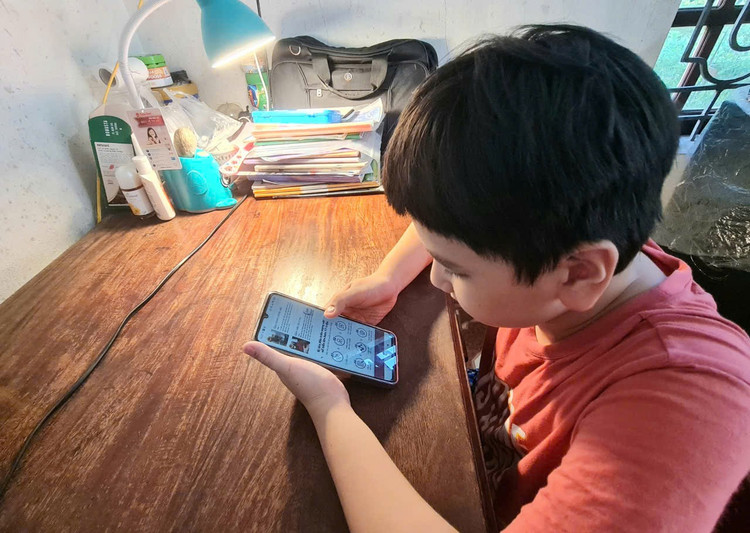Public opinion has recently been shocked by a series of heartbreaking incidents caused by cybercrime. From the story of a 13-year-old girl in Hanoi being lured across Vietnam, to an 11th grade female student being forced to film a sensitive clip for blackmail… despite their different circumstances, the victims all have in common that they are pushed into a state of isolation, panic and are completely controlled by sophisticated psychological manipulation scenarios.

With just a few messages, a bad guy can trap even a well-behaved, intelligent child. It is the gap in digital skills, the lack of deep family connections and the negligence of adults that has become fertile ground for cybercriminals to exploit.
Associate Professor Dr. Pham Manh Ha, University of Education (Hanoi National University) said that instead of criticizing or blaming, parents need to proactively equip their children with a multi-layered "armor" to resist all manipulation tricks.
Critical thinking – the ultimate information “filter”
The first layer of armor, according to Associate Professor Dr. Ha, is the ability to ask questions and have reasonable doubts. Children need to be taught that all information on the Internet must be verified. When someone promises a big reward or urges them to do something right away, they need to ask themselves: "Where did this news come from?", "Why do they want me to do that?". A moment of doubt can help children avoid a big trap.

Personal secrets – “treasures” that cannot be shared: Personal information, from name, date of birth, address to parents’ phone number, especially sensitive images, should never be sent to strangers under any circumstances. Bad guys can use both promises and threats, but children need to understand that this is a limit that cannot be crossed.
Be brave to say “no” and take action: Associate Professor, Dr. Ha emphasized that children need to be given the right to refuse. The power of the “Block” and “Report” buttons on social networks must be considered a protection tool. When receiving an unusual request such as sending photos, transferring money or recharging game cards, children have the right to immediately refuse and report bad content. That is the behavior of a smart internet user.
Managing time and content: A healthy “rule of thumb” online needs to be established with parents, from time limits, choosing safe platforms to regular discussions about what they watch. This is not only a management measure, but also an opportunity for parents and children to better understand the online world .
“Rehearse” real-life situations: Not just stopping at theory, parents should role-play hypothetical situations with their children. From a stranger claiming to be dad’s friend asking to read the OTP code, to a case where someone online compliments and asks for private photos. Rehearsing helps children avoid surprises, know how to react properly and protect themselves when faced with real situations.
When the “radar” signals, what should the child do: Associate Professor, Dr. Nguyen Manh Ha shared that the most important thing is that parents need to turn the house into a “safe zone” where children can comfortably share everything without fear of being scolded. When they feel trusted, children will come to their parents first when they have problems.
He recommends that parents teach their children three simple “help” steps. First, tell your parents immediately, describe the incident calmly and clearly, for example: “Mom, someone texted me asking me to do this…”, and affirm that your parents will always be there. Next, keep evidence by taking screenshots of the messages, saving the link or phone number of the bad guy, because this is very important information. Finally, act together: parents will accompany their children to report bad accounts, and if the incident is serious, they need to immediately contact the authorities such as hotline 113 or the Department of Cyber Security and High-Tech Crime Prevention (A05) for support.
“Parents' trust is the strongest weapon for children, and this “armor” needs to be built from today,” Associate Professor, Dr. Nguyen Manh Ha emphasized.
Don't blame, be one step ahead
According to Associate Professor Dr. Ha, many people still mistakenly believe that victims are deceived because they are naive or lack life skills. In fact, the scammers are professional criminals, using psychological tricks such as impersonating authorities, isolating victims from their families, creating time pressure and rationalizing sick claims. With scripts calculated word by word, any child can become a target.
Therefore, parents need to teach their children to recognize the typical words of a bad person and react immediately: if someone asks to keep a secret from their parents or asks for private photos, it is definitely a scam and the family must be reported immediately.
Careful preparation from the family will create a “mental vaccine” to help children protect themselves from the trap-filled online environment. Each layer of armor is a skill, and when combined, they will form a solid shield. “No secret is worth trading the safety and trust of the family,” Associate Professor Dr. Ha emphasized.
Warning signs that a child is being groomed by a bad guy
Criminologist Dr. Dao Trung Hieu said that warning signs that a child is being lured away from home by a bad person can be identified through unusual changes in daily activities.
The most obvious signs are changes in behavior, emotions and habits of using digital devices. Children may start to hide conversations, suddenly change their phone passwords, secretly text at night. This is accompanied by strange statements expressing dissatisfaction with current life such as: "It's so boring here", "I want to go far away", or hinting that "someone is ready to pick me up somewhere else".
In addition, parents need to be vigilant when they see their children tending to secretly prepare luggage, money or personal items, sometimes even drawing out an "ideal future" in a faraway place without ever discussing it with their parents.
When you see your child is isolating themselves from their family, cutting off contact with friends, idolizing an unknown stranger online, or suddenly having an unusual need to travel far away, parents and teachers need to immediately identify this as a dangerous situation that requires intervention.
Source: https://khoahocdoisong.vn/chuyen-gia-chi-5-lop-giap-bao-ve-con-khoi-bay-lua-dao-post2149045474.html






















![[Photo] The special solidarity relationship between Vietnam and Cuba](https://vphoto.vietnam.vn/thumb/1200x675/vietnam/resource/IMAGE/2025/8/15/5f06c789ab1647c384ccb78b222ad18e)
![[Photo] Prime Minister Pham Minh Chinh talks on the phone with Cambodian Prime Minister Hun Manet](https://vphoto.vietnam.vn/thumb/1200x675/vietnam/resource/IMAGE/2025/8/15/72d3838db8154bafabdadc0a5165677f)
![[Photo] Prime Minister Pham Minh Chinh attends a special art program called "Hanoi - From the historic autumn of 1945"](https://vphoto.vietnam.vn/thumb/1200x675/vietnam/resource/IMAGE/2025/8/15/c1c42655275c40d1be461fee0fd132f3)
![[Photo] Binh Khanh Bridge Ho Chi Minh City is ready to reach the finish line](https://vphoto.vietnam.vn/thumb/1200x675/vietnam/resource/IMAGE/2025/8/14/b0dcfb8ba9374bd9bc29f26e6814cee2)
![[Photo] Firmly marching under the military flag: Ready for the big festival](https://vphoto.vietnam.vn/thumb/1200x675/vietnam/resource/IMAGE/2025/8/15/86df2fb3199343e0b16b178d53f841ec)





































![[Photo] President Luong Cuong receives Finnish Ambassador to Vietnam Keijo Norvanto](https://vphoto.vietnam.vn/thumb/402x226/vietnam/resource/IMAGE/2025/8/15/9787f940853c45d39e9d26b6d6827710)




































Comment (0)